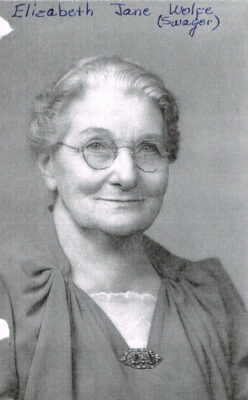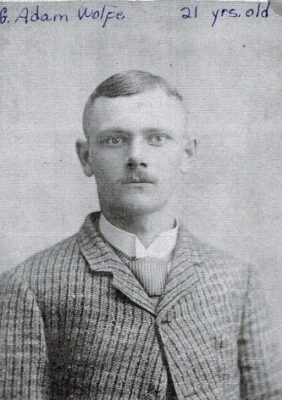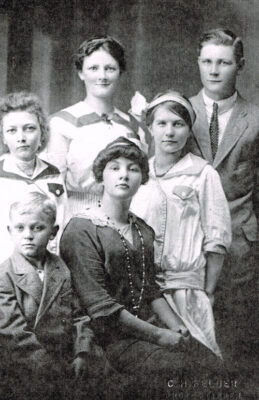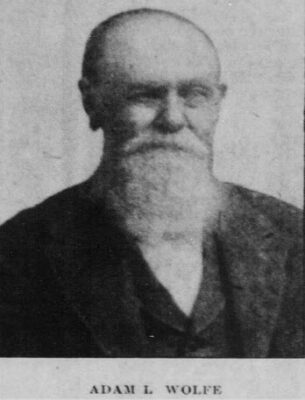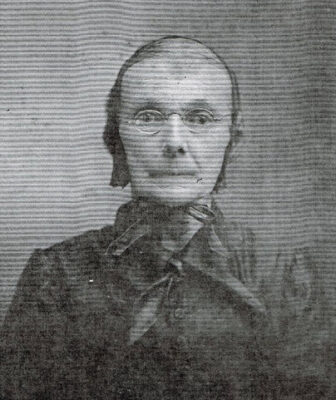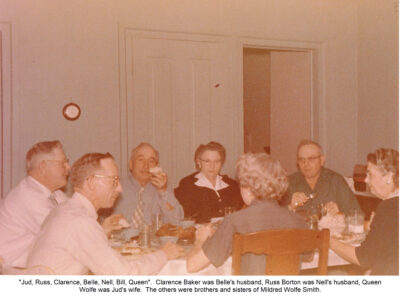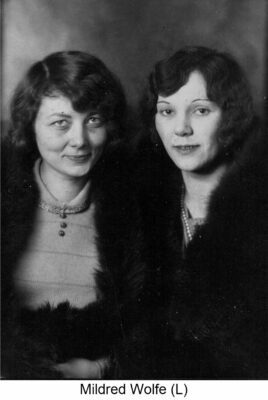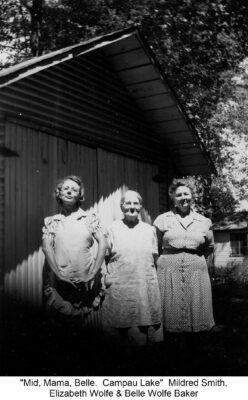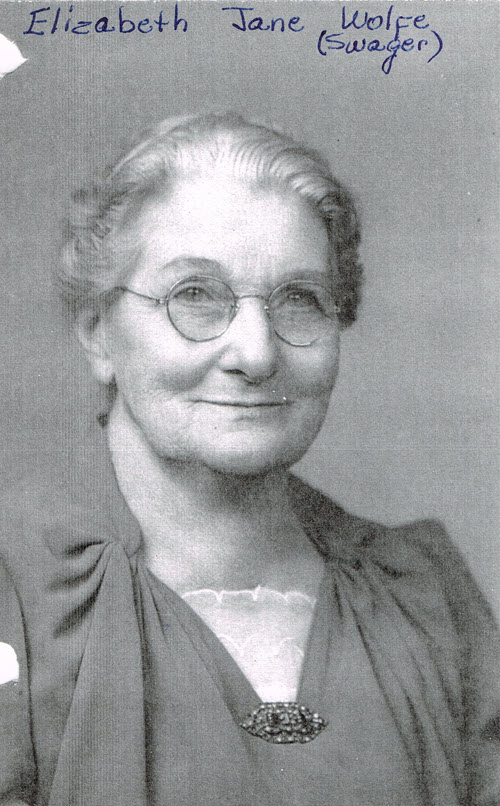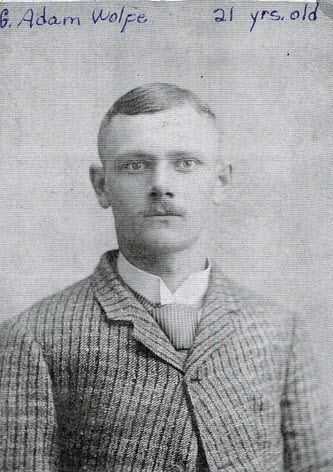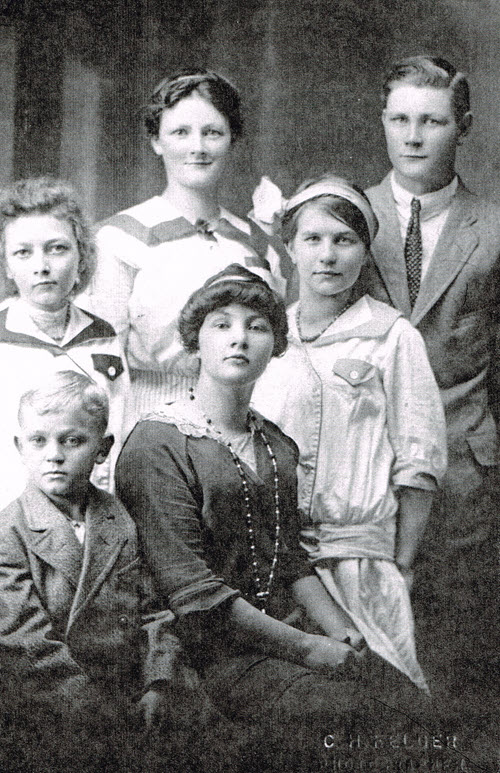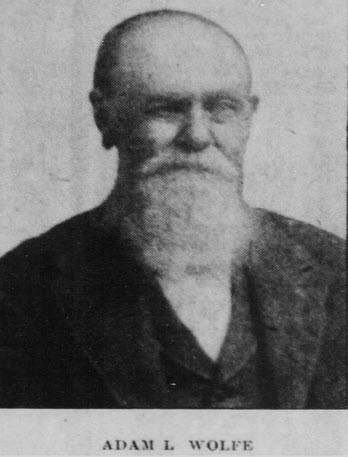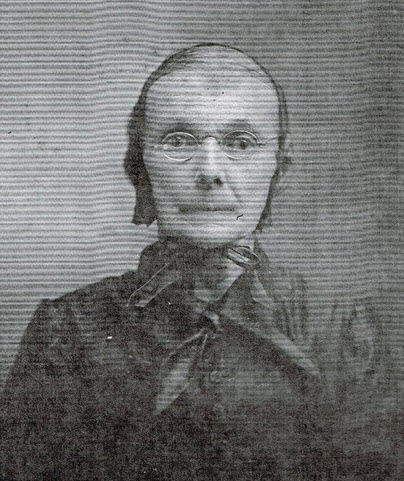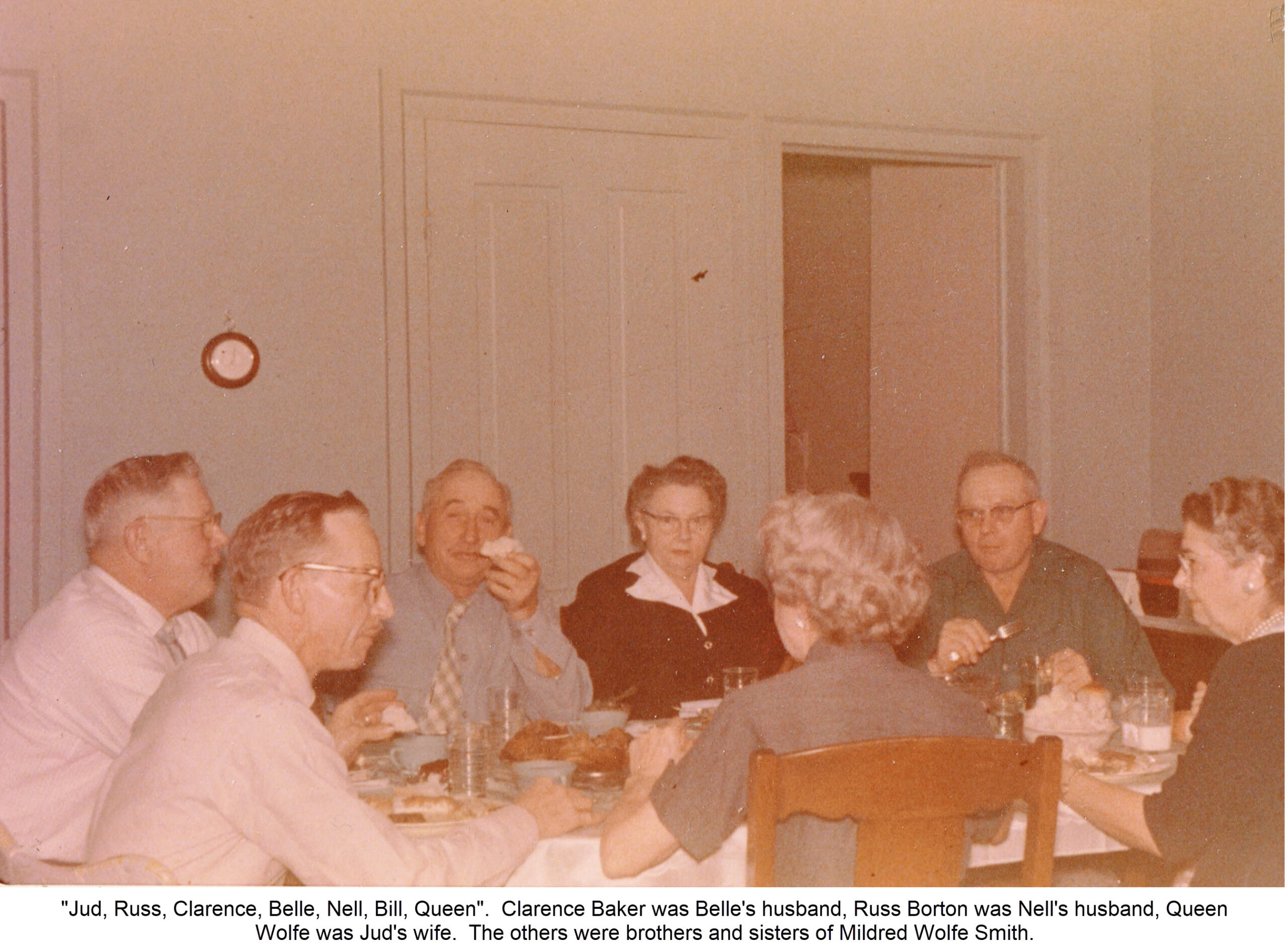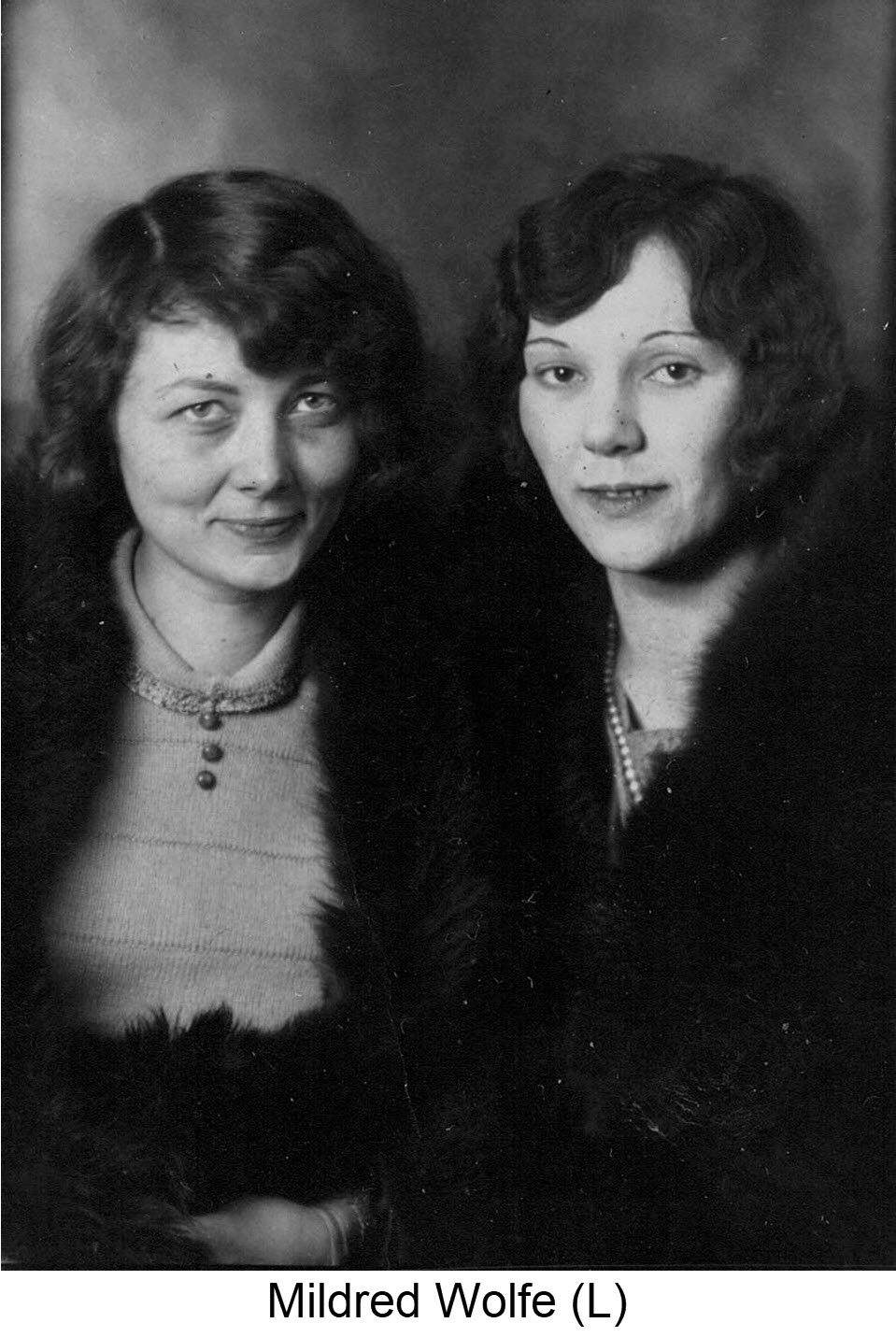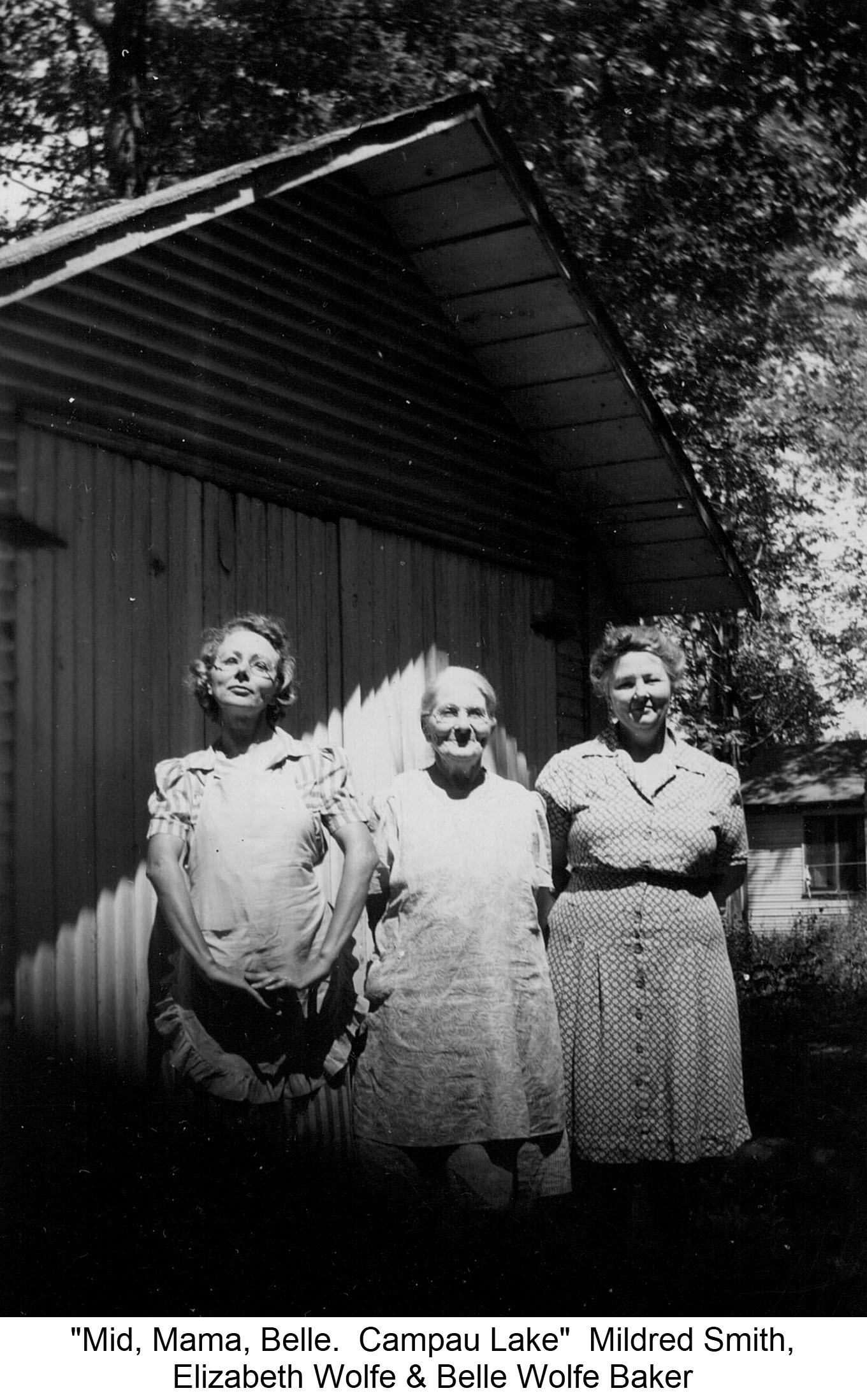George Adam Wolfe
George’s mother, Sarah Kegerreis, was born in 1830 and raised among the “Pennsylvania Dutch” (ethnic German) in Lancaster County, Pennsylvania. She came to Steuben County, IN with her husband, Moses Faustnacht, in 1851, and they raised four children. Moses died in 1865, and in the following year, Sarah married a neighboring farmer, Adam Clark Wolfe. He lived in the township of Steubenville, at the south edge of the county, about seven miles south of Angola. Adam had also lost his first wife, and Adam already had two children. Sarah and Adam Clark began a second family, and George Adam (who was called Adam all his life) was their second and last child together. For more about Adam Clark Wolf and his ancestors, see the post “Adam Clark Wolfe and Family” on this website.
When George Adam’s father died in 1900, he left half of his farm to be sold to help support the children of George Adam’s brother Samuel. Samuel had divorced his wife in 1896. The remaining acreage was probably insufficient to support a family, which may have contributed to George Adam’s decision to sell out and move.
In about 1910 George Adam and Elizabeth moved the family to Reading, in Hillsdale County, Michigan. They must have sold their farm in Steubenville. Reading was only about 25 miles north of their Indiana farm. I don’t know what his occupation was in Reading. Then, in 1913, the family moved to Litchfield, about 10 miles further north (and 20 miles southwest of Jackson) where her father established a sawmill and lumber company. Although by 1913 the oldest children were old enough to be independent, they all seemed to have moved to Litchfield.
His business letterhead said:
“Wolfe Lumber Co.: Manufacturers and Wholesalers of Hardwood Lumber and Ties”
Adam Wolfe: Manager – Jud E. Wolfe: Asst Manager
I don’t know how long the Wolfe Lumber Company continued to operate. The company is listed in the 1919 Hillsdale County directory, but in the 1920 Census George Adam Wolfe’s occupation is listed as Farmer. The 1930 Census shows 60-year-old Adam, Elizabeth, and 25-year-old Bill living in Caledonia, Kent County, Michigan, and Adam’s occupation was “Lumber Buyer”. Adam died in 1936 while staying at the home of his son Jud, in Clarendon, Calhoun County, Michigan. Since neither son lived in Litchfield at that time, it appears the business had closed sometime in the 1920s.
Elizabeth Jane Swager Wolfe
Elizabeth Jane Swager, George’s wife was born in Fort Wayne, Indiana in September 1873. Ft. Wayne appears to have been about the second biggest city in Indiana, behind Indianapolis, at that time. Elizabeth’s father, Peter Swager, was born in 1843 in Fort Wayne. Her mother, Mary Isabelle Cook, was born in 1846 in Schuylkill Haven, Pennsylvania. Mary Isabelle apparently came to Fort Wayne as a girl with her parents from Pennsylvania. Both her parents were born in Pennsylvania, and, although their families had been in Pennsylvania for two or three generations, appear to have been ethnic Germans.
Peter Swager and Mary Isabelle Cook were married in Fort Wayne in July 1864. Not more than two months later, Peter enlisted in the Union Army and went off to war. [Mildred Smith’s other grandfather, Adam Clark Wolfe, also served in the Union Army during the Civil War.] Peter was mustered out in July 1865, and the couple then raised eight children. About 1874 the family moved to Steuben County, Indiana, and they lived somewhere in the vicinity of the Adam Clark Wolfe family, south of Angola.
My mom, Phyllis Smith Bungart, had some slight memories of Mary Cook Swager, her great-grandmother who got married during the Civil War, from when Phyllis was a small child. The only thing I recall was that her great-grandma smoked a corncob pipe.
Elizabeth Swager Wolf was my mom’s (Phyllis Smith Bungart) much-loved Grandma. She was a farm wife and mother of 6, who kept her sense of humor despite hardship and adversity. In her later life she had a very close relationship to her grandchildren. Throughout her years in Litchfield the ‘Angola Herald‘ society page often reported when Mrs. Wolf brought a car-load of Wolfes south to Steuben County for visits to the Wolfes and Swagers still living there, keeping the family together despite the distance.
When my mom was a child in the 30s and early 40s one of the high points of her years was a couple of weeks spent at her grandma’s cottage at Campau Lake, east of Grand Rapids. She also left this note, from a conversation with her cousin:
“Grandpa Wolfe had a sawmill in Litchfield. [In about 1924] Grandpa bought a woods of black walnut near Byron Center, Michigan [just south of Grand Rapids]. The men set up a temporary sawmill and at first the women would send food to them, but then they built cabins. Grandma and Grandpa lived in one; Uncle Jud and Aunt Queen in one (with 3 children); Mr. & Mrs. Robert Cornwell in one; and one was for Elizabeth Swager Wolfe’s brothers; and a family named Smith lived in one. They all stayed there throughout the winter while the men cut timber.”
Anyone familiar with a Michigan winter might stop and consider what hardy and resourceful souls these people were, essentially camping out in the bitter cold for months.
Jud Earlen Wolfe
In 1913 , when the family moved to Litchfield, Jud was 21, and lived with his parents and was working in the lumber company. In April 1917 the U.S. entered World War I, and in 1918 Jud entered the army, received his military training, and was sent overseas to serve at the front in France. Naturally the family worried about his safety, but they would unexpectedly sacrifice a daughter for the war effort instead of their son. Jud was demobilized and returned to the U.S. in the summer of 1919, and married Queen Turner in September 1919. They raised five children.
Sometime in the mid-20s Jud and family left Litchfield and took up farming, probably in Clarendon, Calhoun County, Michigan. After that they were reportedly farming in Hanover, Michigan. In about 1949 Jud, with his sons Robert and Clarence, returned to Litchfield and re-founded Wolfe Lumber, a lumberyard on M-99. This was more than 20 years after his father apparently left the business. He was active in Litchfield’s Rotary Club, the Foreign Legion, and other local organizations, and he seems to have lived in or near Litchfield all his adult life. Jud died in 1958, at age 65. His wife Queen seems to have stayed on in Litchfield, and died in 1983.
Myrtie Isabelle Wolfe
Myrtie Isabelle (Belle) was working as a telephone operator for Bell Telephone in Litchfield when she married Indiana farmer Clarence Baker in 1917. I remember going to their farm somewhere in the vicinity of Angola as a boy in the ’60s. They raised turkeys then, in the old-fashioned, humane way.
Belle and Clarence raised three daughters, and stayed on the farm all their adult lives. I have a note saying Clarence was also a school teacher, but with no further details. Despite being one of the oldest children, Belle out-lived all her siblings, dying in 1986 at age 92. Clarence nearly made it to age 100.
Bessie Mae Wolfe
The next child, Bessie, born in 1896, stayed on as a clerk in the family lumber business after finishing school. In 1918 she decided to help the war effort by taking ‘war work’ in Jackson; filling the job of a man in manufacturing. Able men were in short supply, as they were called up for military service at the same time as the economy was booming. Rosie the Riveter was a widely known World War II symbol of women who took blue-collar jobs to help win the war. Although less publicized, women had done the same in World War I.
I have a few letters from Bessie to her mother and father from her brief time in Jackson. On Sept 3 she wrote that she and her friend Avis had inquired at factories that morning, but found they weren’t hiring any more girls at that time. With new orders coming, they would need help in a few weeks. Bessie and Avis went downtown shopping with friends that afternoon. At a dime store they entered, Bessie inquired about a saleslady job advertised, and was hired on the spot for $8 per week.
On Sep 22 Bessie wrote that “I have had a little cold so stayed away from the factory for two days, then went back for pay day.” Obviously she had already changed jobs.
In an undated letter – possibly Oct 9, she then wrote ” … I am at a different factory now, get $18 per, with a raise to 24 in two weeks. Am instructor (or ‘inspector’?) now, so you can see I can soon retire on my income. I guess I will be home week from Sat. Rachel Cosner is coming with me.”
By Oct 9 she had tragically contracted the disease that would end her life. On Oct 19, aged 22, Bessie Wolfe died of Pneumonia, resulting from Spanish Flu.
On the subject of Spanish Flu, see the letter (below on this site page) written by her first cousin, Henry Sherman Wolfe, who was in Army training at Fort Custer, near Kalamazoo. The letter, ironically written the same week that Bessie contracted Spanish Flu, describes the epidemic precautions taken on his army base. It was published by the newspaper in his hometown of Angola, Indiana.
Nell Wolfe
The next child, Nell, born January 1901, married Russell Borton in 1919. The marriage notice said Russell had a position in Jackson, and they were moving there immediately. However, the 1920 Census showed the couple either living with or next door to her parents in Litchfield. They did soon get to Jackson though, where they lived at 331 Woodland Ave. for the rest of their lives.
Nell was particularly close to Mildred and to my mom, and the family also liked Russ a lot. My mom (Phyllis Smith Bungart) left a long note about him. Here are bits from it:
“Uncle Russ Borton was such a kind, sweet man to me always. A small man with blondish hair and a little mustache. He was quite a dapper fellow. Growing up, I would spend a week in the summer there. Uncle Russ showed the movies at the Family Theatre in Jackson. When they came to our house they would bring us a stack of colored funnies that came in the Detroit Free Press (the Jackson newspaper had B&W comics) and a pile of magazines. During the war when both their sons were away in service, he worked at McCreary Hardware on E. Ganson St. Later he worked at Aeroquip, until his death from cancer [in 1961 at age 60].”
Nell and Russ had two children. Duane spent his career as an airline pilot in California. Russ Jr. stayed in Jackson after the war. See the entry on this website entitled “Russell Borton and the Flying Bathtub“, about Russ Jr.
Mildred Wolfe
Mildred Wolfe, born December 1902, was my grandmother. When Mildred was about 12 years old, not long after the family arrived in Litchfield, she became so seriously ill that she was not expected to live. I believe Pneumonia was involved, and she permanently lost the use of one lung. Her education stopped at the 6th grade, because she could no longer manage to attend school. Phyllis Bungart said that, as an adult, she tired very easily and often had to lie down to rest and recover from headaches. It must have blighted her whole life to some extent, although you would never guess it from her cheerful disposition.
At some time in the early 1920s Mildred moved with a friend to Fort Wayne, Indiana and took a job in a hotel. In 1926 she moved to Jackson. Here’s a note from Phyllis Bungart:
“The Hotel Hayes quickly gained a reputation as one of the best hotels in the state. Located at 228 W. Michigan Ave., the 150-room hotel was built in 1925 and boasted the lavish Georgian Ball Room and was the site of dinner-dances and big band performances. The Drum Room restaurant and lounge, with its shingled canopy and heavily wooded exterior, was another major attraction featuring a private dining room that accommodated small parties of up to 12 people.”
Mildred Wolfe was working at the Keane Hotel in Ft. Wayne, Indiana and rooming with her best friend from Litchfield, Bertha Cornwell. When the Hayes was built in Jackson, her sister Nell, who was living in Jackson at that time with her husband Russ Borton and their two small sons Donald and Duane, coaxed her to come there, live with them, and work at the Hayes. Mildred continued working there [at Hotel Hayes] until after her marriage to Ben Smith. Nell could be counted on to help with babysitting Phyllis (born May 1929) when necessary.”
Adding some detail to this, the Hotel Hayes had 200 rooms on 10 floors, including spaces for full-time residents. This was during Prohibition and early in the Big Band era, when Hotels were often the leading local entertainment venues. The Hotel Hayes opened in November 1926, which must have been when Mildred moved in with Nell and Russ. Waitressing there apparently paid well, because in 1927 Mildred bought a new car. That was unusual for a woman then, in the ‘Flapper’ era. Mildred seems to have continued to work at the Hotel Hayes until 1930 or after.
In 1928 Mildred married Ben Smith, who worked as a welder in shops in Jackson, and they lived in Jackson for several years. Jackson must have been a prosperous and busy place in the 1920s. However, in October 1929 the New York Stock Exchange crashed, marking the beginning of the Great Depression. Gradually business orders slowed, banks began going bankrupt, and the economy wound down. By about 1933 the unemployment rate nationally was 25%. Manufacturing, which Jackson depended upon, was especially hard hit. Many people found it very hard to simply survive.
In 1936 Mildred and Ben with their two children (and probably also her step-daughter Leta), moved from their apartment in Jackson to a small farm that Ben bought, with a loan from his sister, on Seymour Road. Then in their mid-30s, they began a new career as produce farmers, raising vegetables to sell in grocery stores and in front of their home.
They succeeded as farmers, continuing this life until Ben’s sudden death in 1969. (See the pages on this website entitled “Profile of Ben Smith“, “My Memories of My Grandfather; Ben Smith“, and “Memories of Mildred Wolfe Smith” for more information about their lives.)
When Ben died in November 1969, Mildred returned from Florida to her Michigan farm, rather than live alone in their mobile home in Florida. Her own daughter, Phyllis, had been widowed only 6 months before, so they consoled each other. Mildred sold the farm and her Florida mobile home and bought a new mobile home that we set up next door to the Lienhart farm house near Pleasant Lake, Michigan, where Phyllis and, at that time, most of her children lived. Mildred remained there, as almost a part of the Lienhart household, for the rest of her life.
William Albert Wolf
William Albert, (Bill) born June 1905, would marry his brother-in-law Russell Borton’s younger sister Ruth in 1930. Although I know that Mildred and my Mom were quite close to Bill and Ruth, I have very little info on them. Apparently he was a farmer and also operated ‘Wolfe’s Hardware’ in Litchfield. They appear not to have had children. William died in 1967, and Ruth died about 1986.
